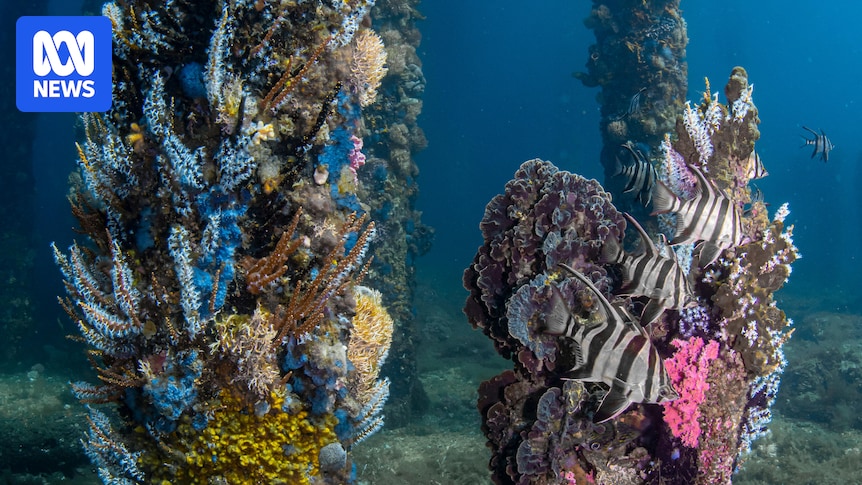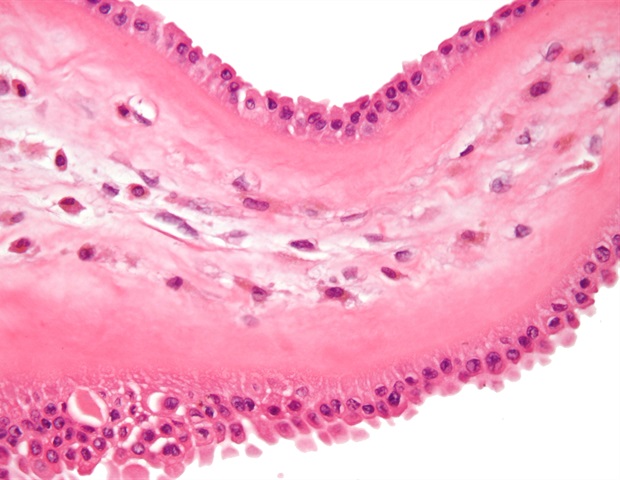A popular tourist destination in WA’s South West could also be home to sea sponges that contain cancer-fighting compounds.
Scientists from the University of Western Australia are collaborating with Busselton Jetty’s management to investigate chemicals found in the natural defence mechanisms of marine sponges that live under the jetty.
Lead researcher and marine chemistry specialist Darren Holland said there were already two cancer-fighting drugs derived from marine sponges but little research had been done on WA’s native species.
Darren Holland is a UWA marine chemist. (Supplied: University of Western Australia)
“Not much has been done in the South West region with marine sponges, let alone WA in general, so it’s really exciting to learn more about Busselton’s marine sponge community,” he said.
Dr Holland said the waters below the Busselton Jetty contained a remarkable biodiversity, including more than 300 marine species and a wealth of unexplored temperate marine sponges.
“The jetty is really unique because it’s Australia’s largest artificial reef, so it gives this really unique snapshot of WA’s marine biodiversity,” he said.
View from the Busselton Jetty observation deck. (ABC South West: Jacqueline Lynch)
Dr Holland said natural products like the anti-cancer compounds found in marine sponges had always been a valuable source for medicine.
“A lot of our current approved drugs are based on natural products, like penicillin, aspirin, and morphine,” he said.
‘A long road’ for research
The preliminary phase of the study will involve the collection and analysis of approximately 20 sponge species from Busselton Jetty, creating an extract library for in vitro anti-cancer screening.
“We want to make this really sustainable, so we are only taking small amounts, as some of these sponges are very rare,” Dr Holland said.
“Phase one will focus on identifying sponges with anti-cancer activity, with an emphasis on engaging the local community through the Marine Discovery Centre at Busselton Jetty.
At 1841 metres, Busselton Jetty is the longest wooden-piled jetty in the Southern Hemisphere. (ABC South West: Jacqueline Lynch)
“It is a long road — it takes a while to take a drug form here to market but having that knowledge is powerful.”
The Busselton Jetty — said to be longest timber-piled jetty in the Southern Hemisphere — raised $25,000 to help fund the upcoming six-month trial, which will involve divers removing the sea sponges once the research permit is granted.
The attraction’s chief executive officer Lisa Shreeve said she was eager to help researchers unlock the potential of the biodiversity under the jetty.
“The sponges have this natural repelling property so any creature that may come up to a sponge on a pylon under the jetty, they naturally fight them by excreting this … compound,” she said.
Lisa Shreeve is the CEO of Busselton Jetty. (ABC South West: Jacqueline Lynch)
Mr Shreeve said early trials had shown the sea sponges’ anti-cancer compound killed cancer cells in petri dishes.
“So, it’s so exciting that a trial like this could eventually get to a clinical trial and then maybe picked up by a drug company … [to] make a drug which can kill … cancer cells in people,” she said.
Ms Shreeve said while the sea sponges weren’t found just under the jetty, structure’s almost 600 sea-sponge-covered pylons provided easy access for collecting samples.
Collection of marine sponge samples at the jetty is expected to begin in February.





